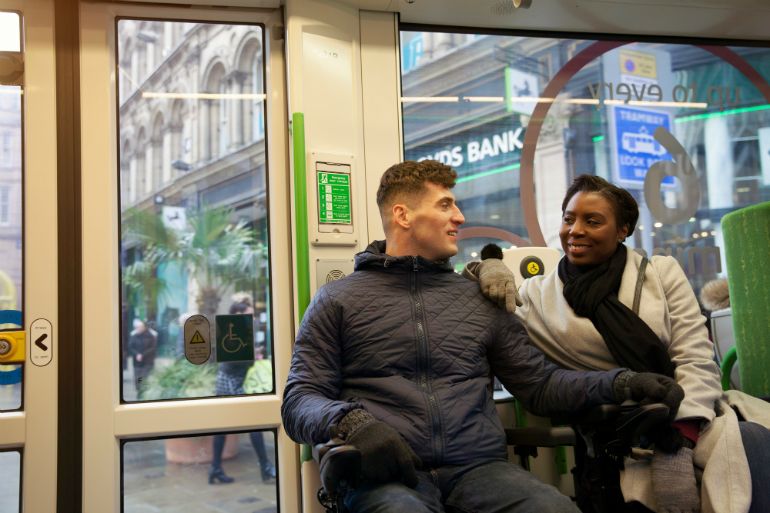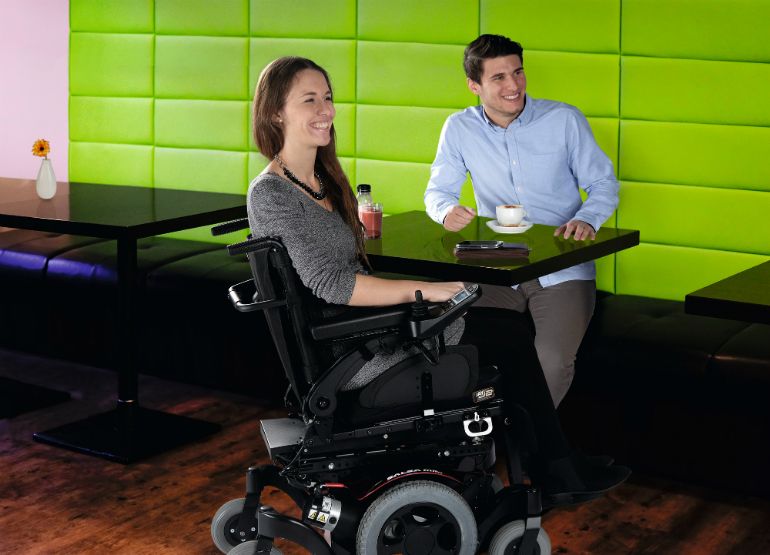Share:
Take it offline!
This Education in Motion resource is also available as a printable PDF.
Download PDF
The disability world is full of romance myths, some of which can be incredibly disheartening for members of the disability community, and when assumptions are particularly destructive, they can actually perpetuate ableism. Despite common misconceptions, negative stereotypes, and ableist assumptions, people with disabilities fall in love every day. Dating with disability is possible; disability can be part of a happily ever after. These are some of the most common disability dating myths and the facts that prove them wrong.
Myth 1: ‘Normal’ Dates Aren’t Possible for People With Disabilities
One common assumption is that ‘normal’ or typical dates aren’t possible for people with disabilities. This is a myth. People with disabilities enjoy the same things that able-bodied people do, and dating is no exception. Common date activities like going to a movie, sporting event, or fancy restaurant are possible for many people who live with disabilities. Sometimes, accommodations do need to be made. For example, a person with mobility restrictions may need to park closer to the cinema door, or someone who lives with food restrictions may opt for a date that doesn’t involve a meal. These choices are simple and by no means destroy the chance of a wonderful new relationship.
Myth 2: Dating With Disability Is Awkward
Yes, dating with disability can be awkward, but only because dating itself, regardless of ability, can be awkward. While a disability may result in some candid conversations occurring earlier in a relationship than they perhaps otherwise would, disability doesn’t have to be a deciding factor in how comfortable two people are with each other. People with disabilities are as varied and multi-faceted as able-bodied people. They have hopes, dreams, families, hobbies, jobs, and responsibilities. There’s plenty to talk about beyond disability and illness.
Myth 3: People With Disabilities Can Only Date Other People With Disabilities
Many people believe that people with disabilities can only fall in love with others who share the disability experience. While a shared understanding of disability may be something in common, it’s not necessary for a healthy relationship. People with disabilities have full identities. They can find mutual interests and fall in love with able-bodied people as well as other people with disabilities.
 Myth 4: There’s No One Out There!
Myth 4: There’s No One Out There!
Unfortunately, many people with disabilities worry that there’s no one out there for them, but this is untrue. Many people with disabilities have found true love, and disability does not need to inhibit dating prospects. Finding meaningful connections can be a challenge for all people, but there are billions of fish in the sea, and there’s no reason that disability should prevent anyone from finding their soulmate.
Myth 5: There Are No Disability-Inclusive Dating Sites
Dating sites have become the pathway to modern match-making, and disability has not been left out of the tech romance revolution! A number of dating apps have been created to help people with disabilities on the search for ‘the one’. Gutsy Dating is a dating app designed specifically for people who live with digestive health problems like Celiac Disease, Crohn’s Disease, and Inflammatory Bowel Syndrome. Lemonayde is a popular site for people with chronic illnesses, where users can choose whether or not to disclose their specific conditions.
Myth 6: People With Disabilities Are Likely To Be Offended
Many people with disabilities have a great sense of humour and patience when it comes to educating others on the effects of their conditions. Sometimes, able-bodied people worry that they will accidentally miscommunicate or offend people with disabilities, but overcautious wording is usually unnecessary. While it’s important to be as respectful and kind as possible, people with disabilities don’t need the people around them to walk on metaphorical eggshells.
Myth 7: People With Disabilities Can’t Meet New People
Like able-bodied people, people with disabilities live full and diverse lives. They engage in education, work, volunteer activities, and hobbies. People with disabilities are more than capable of meeting new people, in the same ways and places that able-bodied people would do so.
 Myth 8: Disability = Burden
Myth 8: Disability = Burden
It’s commonly assumed that the able-bodied partners of people with disabilities will be required to tolerate unreasonable burdens or responsibilities. This is untrue. Disability is not a burden. Many people with disabilities are capable of fulfilling their own basic needs without help. Some people do require the assistance of loved ones and caregivers, but the same can be said for members of the able-bodied community, who need support in different ways. People with disabilities can provide emotional support, compassion, and companionship to their partners. Relationships that include disability are no different from able relationships: they involve give and take from both parties.
Myth 9: Dating Someone With A Disability Will Be Boring
Often, it’s believed that people with disabilities are incapable of engaging in fun events and adventures, like travel, concerts, festivals, and so on. This is false. People with disabilities may have different needs or may use different supports to participate in fun activities, but they are capable of enjoying the same things that able-bodied people enjoy. Like any group of people, people with disabilities are diverse, and they approach life from many different perspectives.
Myth 10: Disability Prevents Couples From Having a ‘Normal’ Relationship
What classifies as a ‘normal’ relationship? Every relationship is different because every person is different. While disability may influence the dynamic of a couple, it isn’t the sole factor in predicting what a relationship will look like or whether it will succeed. For people with disabilities, ‘normal’ is as subjective and variable as it is for anyone else.
Dating can be difficult for a lot of people, but disability doesn’t reduce anyone’s chances of finding true love. The key to finding a good, healthy relationship is approaching dating with an open mind and plenty of self-confidence!